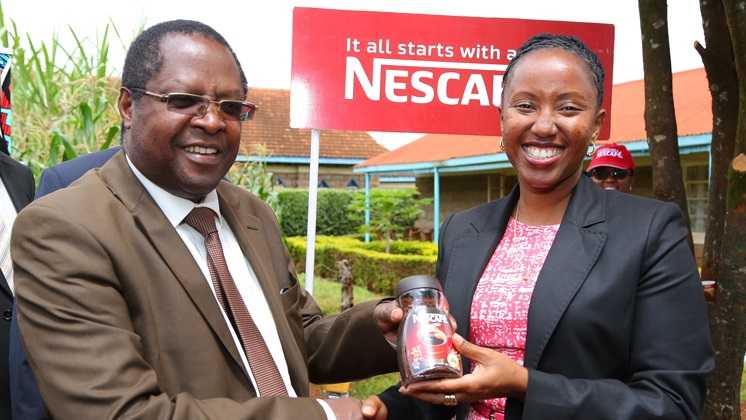Nestlé has today unveiled its plan to spend about Sh40million (US$500,000) to boost coffee production and encourage participation of both women and youth in coffee farming across Central and Eastern Kenya.
The funds will finance the second phase of the Nescafé Plan programme, which has been renewed to offer training and technical support to about 41,000 coffee farmers for the next three years.
Nestlé, the world’s leading Nutrition, Health and Wellness Company through its Nescafé Plan implementation partner Coffee Management Services (CMS) Limited has already recruited an additional 15, 000 coffee farmers and 5 coffee farmers’ co-operative societies to be part of this renewed programme.
This is an addition to the 26,000 farming families and 9 co-operatives already benefitting from the coffee management training and technical support.
“The renewal of the Nescafé Plan follows the successes made in the first phase where we invested about Sh30million. On average, the Farmers’ Co-operative Societies recorded an 83 percent rise in coffee production while the quantity of coffee produced per tree increased from 2.5Kgs per tree to up-to 10Kgs between 2011 and 2014,” said Ciru Miring’u, Managing Director at Nestlé Kenya (in the picture).
Thousands of farmers have also adopted the Batian coffee variety which is high yielding and disease resistant, hence the production is likely to more than double in two years according to Ms. Miring’u.
The Nescafé Plan is a global initiative by Nestlé to create value across the coffee supply chain, from farmers to consumers. In Kenya, Nestlé launched the Nescafé Plan in 2011 with Coffee Management Services Ltd as the implementing partner.
“Another aim of the Nescafé Plan has been to promote the inclusion of women and youth in coffee farming and cooperatives administration, both of which recorded tremendous success in phase one. We have noted a 5 percent increase in youth participation since 2011,” said Ms. Miring’u.
About 4000 women have been trained on cooperative leadership, coffee production, confidence building, self-development and coffee verification,” she added.
Nescafé Plan II provides a great opportunity for women and youth as they will be empowered to take up leadership roles in coffee farming and allow them to receive intensive technical support.
The first phase of the plan involved nine Coffee Farmers’ Cooperative Societies from Kiambu, Murang’a, Kirinyaga, Nyeri, Embu and Meru counties.
Nescafé Plan aims to build capacity by offering training and technical support to farmers. It hopes this will help to improve productivity, quality, and higher incomes for farmers.
The Nescafé Plan is part of Nestlé’s Creating Shared Value (CSV) principle; it believes that for a business to prosper over the long term, the communities around it must also prosper. Nestlé creates shared value in three areas: nutrition, water and rural development.
“Our aim is to continue improving the living standards of the farmers, establish more demo plots for the cooperative societies where training will be conducted and also recruit more promoter farmers among other things. We also provide market access to these coffee producers,” explained Ms. Miring’u.




















